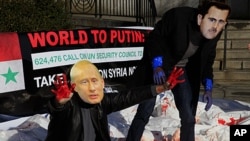Britain, France and the United States condemned Russia’s sales of weapons to Syria on Tuesday, saying it is contributing to violence in that country.
Without naming Russia directly, but making it clear that it was the country they were speaking about, the three ambassadors separately criticized Moscow’s arms deals with Damascus during a meeting about the wider Middle East in the United Nations Security Council.
Russia has been in the news recently because a Russian ship carrying ammunition sailed to the Syrian port of Tartus, and most recently it was reported in Moscow that the government has signed a $500 million deal to sell Damascus 36 fighter jets.
U.S. Ambassador Susan Rice said Washington is concerned by reports of shipments of arms and munitions to the government of Syrian President Bashar al-Assad.
“We call on supplier countries to voluntarily halt arms transfers to the regime," said Rice. "And we encourage all nations to join the widening effort to stop the flow of weapons to the Assad regime.”
Britain’s U.N. ambassador, Mark Lyall Grant, said his government is concerned about weapons reaching Syria, both those sold or smuggled to the government or the opposition. And Lyall Grant took issue with a recent interview Russia’s ambassador gave to the BBC in which he said that Moscow’s continued sale of arms to Damascus had “no effect on the situation at all.”
“We fundamentally disagree," said Grant. "It is glaringly obvious that transferring weapons into a volatile and violent situation is irresponsible and will only fuel the bloodshed.”
France’s envoy, Gérard Araud, was more direct, urging arms embargoes be imposed and mentioning the movement of weapons from Iran into Syria. He is heard here through a translator:
“It is unacceptable for countries, including within the [Security] Council, to continue to provide the means by which violence is committed against the Syrian people,” said Araud.
Both the Russian and Chinese ambassadors were silent on the subject of Syria during their remarks.
Western powers have suggested that Arab League Secretary-General Nabil Elaraby brief the Security Council on the League’s monitoring mission, which has just finished a month-long visit to Syria that has been plagued with difficulties.
On Tuesday, Syria’s national news agency reported that the Interior Ministry has agreed to extend the mission’s mandate for a second month, despite rejecting the Arab proposal for ending the crisis that includes President Assad transferring power to a deputy and preparations for elections.
The United Nations also has confirmed that it received a letter from the head of the Arab League requesting a meeting with U.N. Secretary-General Ban Ki-moon to present its proposals on resolving the crisis and seek the Security Council’s support.




